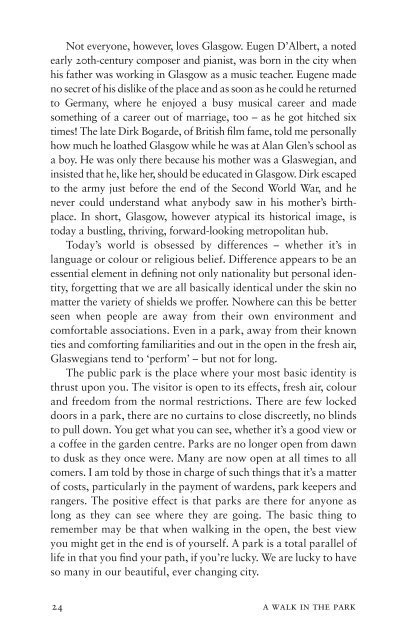A Walk in the Park by John Cairney sampler
A wander through twelve of Glasgow’s finest parks, and through the mind of a treasured Glasgow resident, John Cairney. Cairney’s exploration of his home city’s dear green places ranges from Tollcross Park in the east, to the Botanic Gardens, pride of the West End, and even right out to Hogganfield Loch in the city’s furthest reaches. Written with a deep love of the city, A Walk in the Park takes us on a journey into Glasgow’s past as well as through its outdoor spaces. Cairney traces his city’s history back a millennium to its founding by that great wanderer, St Mungo. Through the stories of its parks Glasgow comes to life, a post-industrial city with an unmatched individuality, a thriving cultural scene, and a lot to look forward to.
A wander through twelve of Glasgow’s finest parks, and through the mind of a treasured Glasgow resident, John Cairney. Cairney’s exploration of his home city’s dear green places ranges from Tollcross Park in the east, to the Botanic Gardens, pride of the West End, and even right out to Hogganfield Loch in the city’s furthest reaches.
Written with a deep love of the city, A Walk in the Park takes us on a journey into Glasgow’s past as well as through its outdoor spaces. Cairney traces his city’s history back a millennium to its founding by that great wanderer, St Mungo. Through the stories of its parks Glasgow comes to life, a post-industrial city with an unmatched individuality, a thriving cultural scene, and a lot to look forward to.
Create successful ePaper yourself
Turn your PDF publications into a flip-book with our unique Google optimized e-Paper software.
Not everyone, however, loves Glasgow. Eugen D’Albert, a noted<br />
early 20th-century composer and pianist, was born <strong>in</strong> <strong>the</strong> city when<br />
his fa<strong>the</strong>r was work<strong>in</strong>g <strong>in</strong> Glasgow as a music teacher. Eugene made<br />
no secret of his dislike of <strong>the</strong> place and as soon as he could he returned<br />
to Germany, where he enjoyed a busy musical career and made<br />
someth<strong>in</strong>g of a career out of marriage, too – as he got hitched six<br />
times! The late Dirk Bogarde, of British film fame, told me personally<br />
how much he loa<strong>the</strong>d Glasgow while he was at Alan Glen’s school as<br />
a boy. He was only <strong>the</strong>re because his mo<strong>the</strong>r was a Glaswegian, and<br />
<strong>in</strong>sisted that he, like her, should be educated <strong>in</strong> Glasgow. Dirk escaped<br />
to <strong>the</strong> army just before <strong>the</strong> end of <strong>the</strong> Second World War, and he<br />
never could understand what anybody saw <strong>in</strong> his mo<strong>the</strong>r’s birthplace.<br />
In short, Glasgow, however atypical its historical image, is<br />
today a bustl<strong>in</strong>g, thriv<strong>in</strong>g, forward-look<strong>in</strong>g metropolitan hub.<br />
Today’s world is obsessed <strong>by</strong> differences – whe<strong>the</strong>r it’s <strong>in</strong><br />
language or colour or religious belief. Difference appears to be an<br />
essential element <strong>in</strong> def<strong>in</strong><strong>in</strong>g not only nationality but personal identity,<br />
forgett<strong>in</strong>g that we are all basically identical under <strong>the</strong> sk<strong>in</strong> no<br />
matter <strong>the</strong> variety of shields we proffer. Nowhere can this be better<br />
seen when people are away from <strong>the</strong>ir own environment and<br />
comfortable associations. Even <strong>in</strong> a park, away from <strong>the</strong>ir known<br />
ties and comfort<strong>in</strong>g familiarities and out <strong>in</strong> <strong>the</strong> open <strong>in</strong> <strong>the</strong> fresh air,<br />
Glaswegians tend to ‘perform’ – but not for long.<br />
The public park is <strong>the</strong> place where your most basic identity is<br />
thrust upon you. The visitor is open to its effects, fresh air, colour<br />
and freedom from <strong>the</strong> normal restrictions. There are few locked<br />
doors <strong>in</strong> a park, <strong>the</strong>re are no curta<strong>in</strong>s to close discreetly, no bl<strong>in</strong>ds<br />
to pull down. You get what you can see, whe<strong>the</strong>r it’s a good view or<br />
a coffee <strong>in</strong> <strong>the</strong> garden centre. <strong>Park</strong>s are no longer open from dawn<br />
to dusk as <strong>the</strong>y once were. Many are now open at all times to all<br />
comers. I am told <strong>by</strong> those <strong>in</strong> charge of such th<strong>in</strong>gs that it’s a matter<br />
of costs, particularly <strong>in</strong> <strong>the</strong> payment of wardens, park keepers and<br />
rangers. The positive effect is that parks are <strong>the</strong>re for anyone as<br />
long as <strong>the</strong>y can see where <strong>the</strong>y are go<strong>in</strong>g. The basic th<strong>in</strong>g to<br />
remember may be that when walk<strong>in</strong>g <strong>in</strong> <strong>the</strong> open, <strong>the</strong> best view<br />
you might get <strong>in</strong> <strong>the</strong> end is of yourself. A park is a total parallel of<br />
life <strong>in</strong> that you f<strong>in</strong>d your path, if you’re lucky. We are lucky to have<br />
so many <strong>in</strong> our beautiful, ever chang<strong>in</strong>g city.<br />
24 a walk <strong>in</strong> <strong>the</strong> park


















